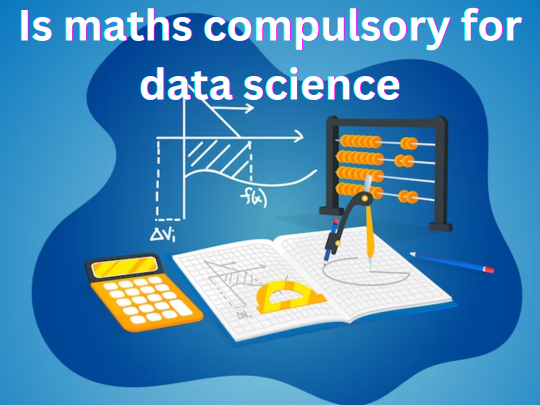Table of Contents
ToggleMathematics is an essential component of data science. It is a fundamental tool that helps data scientists extract insights from data and make informed decisions. Without mathematics, data science cannot exist as it is a discipline that relies on mathematical concepts and statistical methods to analyse data. In this essay, we will explore the role of mathematics in data science and why it is compulsory.
The field of data science involves the integration of statistical analysis, computer science, and subject matter expertise to derive meaningful insights from data. It involves the use of computational and statistical techniques to analyse and interpret large datasets. A data scientist’s role is to transform complex data into actionable insights that can inform business decisions. They use a variety of tools, techniques, and algorithms to extract meaningful information from data.
Data Science:
Learn the core concepts of Data Science Course video on Youtube:
Mathematics is at the core of data science. It provides the foundation for statistical and machine learning algorithms that are used to analyse data. Mathematics is used to develop models that can identify patterns and relationships within data. These models can then be used to make predictions or generate recommendations.
Probability and Statistics:
In the realm of data science, the utilization of probability and statistics serves as a fundamental aspect and plays a critical role. They are used to analyse data and make inferences from it. Probability theory is used to quantify uncertainty, and statistics is used to draw conclusions from data. These two concepts are used to develop models that can identify patterns in data, estimate parameters of a distribution, and test hypotheses. Understanding probability and statistics is crucial for data scientists because they are used to determine the accuracy of predictions made by models.
Linear Algebra:
Linear algebra is another essential concept in data science. It is used to represent data in a matrix form, which allows data scientists to perform operations such as matrix multiplication, matrix inversion, and matrix decomposition. These operations are used to extract features from data, reduce the dimensionality of data, and solve optimization problems. Linear algebra is also used in machine learning algorithms, such as neural networks, which are used to recognize patterns in data.
Calculus:
Calculus is used in data science to optimize models and algorithms. It is used to find the maximum or minimum of a function, which is useful in optimization problems. Calculus is also used in machine learning algorithms, such as gradient descent, which is used to minimize the cost function of a model. Understanding calculus is essential for data scientists because it allows them to develop models that can make accurate predictions.
Data Visualization:
Data visualization is a critical component of data science. It is used to communicate insights from data to non-technical stakeholders. Mathematics is used in data visualization to develop charts and graphs that can represent data in a meaningful way. Data visualization helps data scientists identify patterns and relationships within data, which can then be used to make informed decisions.
To learn more about Data Science the best place is 360DigiTMG, with multiple awards in its name 360DigiTMG is the best to start your Data science course in Pune. Enroll now!
Machine Learning:
The development of algorithms that possess the ability to learn from data is the primary focus of machine learning, which is a specialized area within the broader scope of artificial intelligence. Mathematics is used extensively in machine learning to develop models that can identify patterns in data, make predictions, and generate recommendations. Machine learning algorithms are used in a variety of applications, such as image recognition, natural language processing, and fraud detection.
Data pre-processing is the process of cleaning, transforming, and preparing raw data for analysis. Mathematics plays a crucial role in data pre-processing as it is used to identify and handle missing values, outliers, and data normalization. Data normalization refers to the procedure of standardizing data to a uniform range, facilitating equitable comparisons between distinct features. Mathematics is also used in feature engineering, which involves creating new features from existing data to improve model performance.
360DigiTMG the award-winning training institute offers data science course in Chennai, and become certified professionals
Optimization:
The process of identifying the optimal solution to a problem is known as optimization. In data science, optimization is used to find the best parameters for a model. This involves minimizing a cost function that measures the difference between the predicted and actual values. Mathematics is used in optimization to find the minimum or maximum of a function. Optimization algorithms such as gradient descent are used in machine learning to minimize the cost function of a model.
Looking forward to becoming a Data Scientist? Check out the Data Science Course in Hyderabad and get certified today.
Probability Distributions:
Probability distributions are used in data science to model the behaviour of data. A probability distribution describes the likelihood of different outcomes in a random event. Understanding probability distributions is essential for data scientists as it helps them choose the appropriate model for a given dataset. Common probability distributions used in data science include the normal distribution, Poisson distribution, and Bernoulli distribution.
Being a Data Scientist is just a step away. check out Data Science Course in Banglore at 360DigiTMG and get certified today.
Statistical Inference:
Statistical inference is the process of making conclusions about a population based on a sample. In data science, statistical inference is used to test hypotheses and make predictions. Mathematics is used in statistical inference to calculate confidence intervals and p-values. In statistics, a confidence interval denotes a range of values within which the actual population parameter is expected to lie with a specific degree of confidence. On the other hand, a p-value is a statistical measure that quantifies the degree of evidence against the null hypothesis.
Algorithm Design:
Algorithm design is the process of creating efficient and effective algorithms to solve specific problems. Mathematics is used extensively in algorithm design as it provides the tools to analyse the complexity of algorithms and to optimize them. Understanding algorithm design is crucial for data scientists as it allows them to develop efficient algorithms that can handle large datasets and complex problems.
Become a Data Scientist with 360DigiTMG data science course. Get trained by the alumni from IIT,IIM,and ISB.
In conclusion, mathematics is an essential tool for data scientists. It is used to develop models that can identify patterns and relationships within data, make accurate predictions, and generate meaningful insights. Mathematics is used in probability and statistics, linear algebra, calculus, data visualization, machine learning, data pre-processing, optimization, probability distributions, statistical inference, and algorithm design. Data scientists must have a strong understanding of mathematics to be successful in their field.
Anusha
Data Science Placement Success Story
Data Science Training Institutes in Other Locations
Tirunelveli, Kothrud, Ahmedabad, Hebbal, Chengalpattu, Borivali, Udaipur, Trichur, Tiruchchirappalli, Srinagar, Ludhiana, Shimoga, Shimla, Siliguri, Rourkela, Roorkee, Pondicherry, Rajkot, Ranchi, Rohtak, Pimpri, Moradabad, Mohali, Meerut, Madurai, Kolhapur, Khammam, Jodhpur, Jamshedpur, Jammu, Jalandhar, Jabalpur, Gandhinagar, Ghaziabad, Gorakhpur, Gwalior, Ernakulam, Erode, Durgapur, Dombivli, Dehradun, Cochin, Bhubaneswar, Bhopal, Anantapur, Anand, Amritsar, Agra , Kharadi, Calicut, Yelahanka, Salem, Thane, Andhra Pradesh, Greater Warangal, Kompally, Mumbai, Anna Nagar, ECIL, Guduvanchery, Kalaburagi, Porur, Chromepet, Kochi, Kolkata, Indore, Navi Mumbai, Raipur, Coimbatore, Bhilai, Dilsukhnagar, Thoraipakkam, Uppal, Vijayawada, Vizag, Gurgaon, Bangalore, Surat, Kanpur, Chennai, Aurangabad, Hoodi,Noida, Trichy, Mangalore, Mysore, Delhi NCR, Chandigarh, Guwahati, Guntur, Varanasi, Faridabad, Thiruvananthapuram, Nashik, Patna, Lucknow, Nagpur, Vadodara, Jaipur, Hyderabad, Pune, Kalyan.
Data Analyst Courses In Other Locations
Tirunelveli, Kothrud, Ahmedabad, Chengalpattu, Borivali, Udaipur, Trichur, Tiruchchirappalli, Srinagar, Ludhiana, Shimoga, Shimla, Siliguri, Rourkela, Roorkee, Pondicherry, Rohtak, Ranchi, Rajkot, Pimpri, Moradabad, Mohali, Meerut, Madurai, Kolhapur, Khammam, Jodhpur, Jamshedpur, Jammu, Jalandhar, Jabalpur, Gwalior, Gorakhpur, Ghaziabad, Gandhinagar, Erode, Ernakulam, Durgapur, Dombivli, Dehradun, Bhubaneswar, Cochin, Bhopal, Anantapur, Anand, Amritsar, Agra, Kharadi, Calicut, Yelahanka, Salem, Thane, Andhra Pradesh, Warangal, Kompally, Mumbai, Anna Nagar, Dilsukhnagar, ECIL, Chromepet, Thoraipakkam, Uppal, Bhilai, Guduvanchery, Indore, Kalaburagi, Kochi, Navi Mumbai, Porur, Raipur, Vijayawada, Vizag, Surat, Kanpur, Aurangabad, Trichy, Mangalore, Mysore, Chandigarh, Guwahati, Guntur, Varanasi, Faridabad, Thiruvananthapuram, Nashik, Patna, Lucknow, Nagpur, Vadodara, Jaipur, Hyderabad, Pune, Kalyan, Delhi, Kolkata, Noida, Chennai, Bangalore, Gurgaon, Coimbatore.
Navigate To:
360DigiTMG – Data Analytics, Data Analyst Course Training in Bangalore
#62/1, Ground Floor, 1st Cross, 2nd Main, Ganganagar 560032, Bangalore, Karnataka
Phone: 1800-212-654321
Email: enquiry@360digitmg.com
Get Direction: data science courses in bangalore



